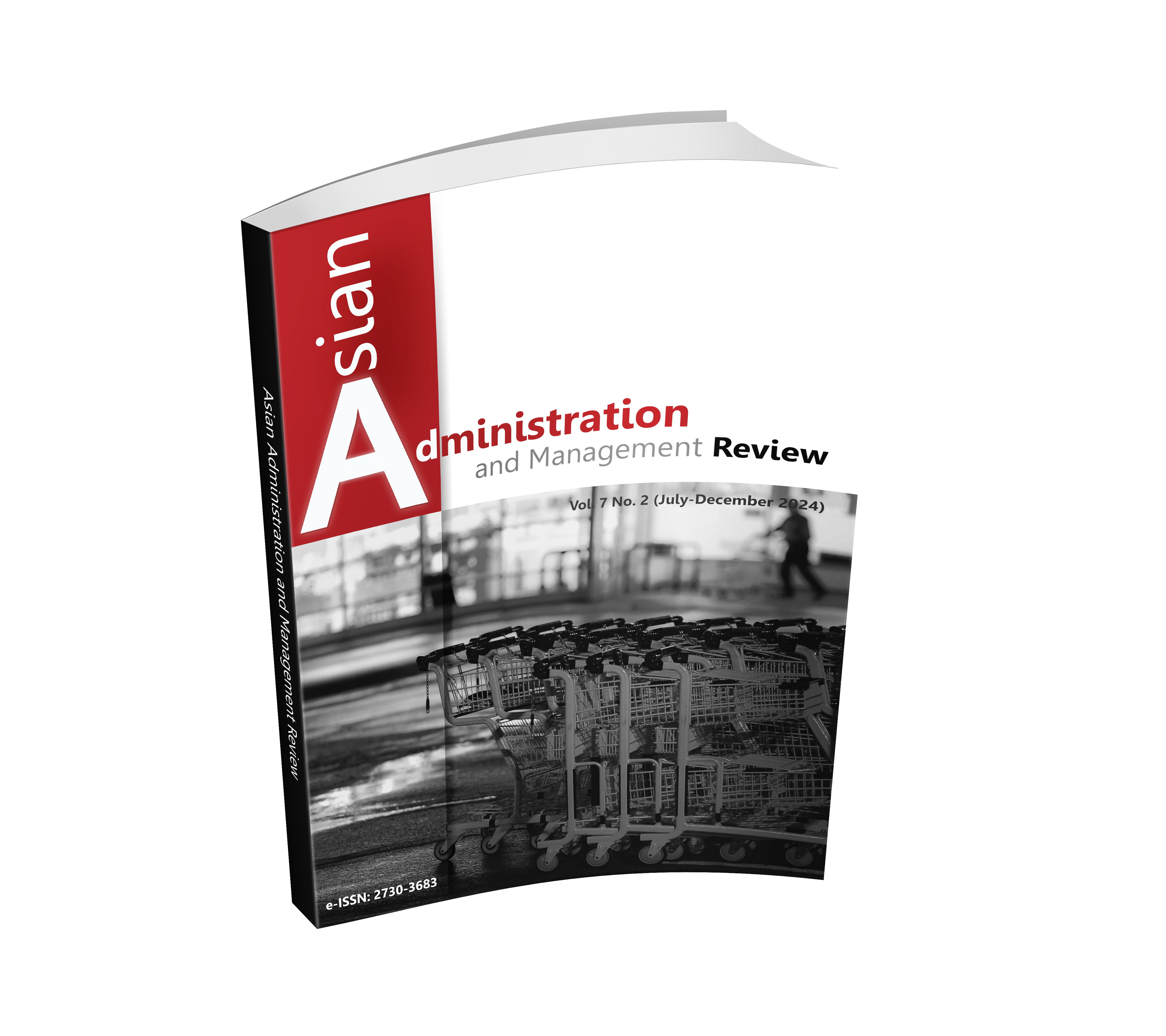GUIDELINES FOR CREATING INCENTIVES FOR PAYING TAXES VIA ELECTRONIC SYSTEMS FOR ENTREPRENEURS
DOI:
https://doi.org/10.14456/aamr.2024.27Keywords:
Creating Incentives, Payment of Taxes through Electronic Systems, EntrepreneursAbstract
According to the current situation, the Department of Revenue focuses on enhancing tax compliance through electronic systems, aiming to elevate the department and align with government policies that stimulate small-scale investment and financial measures. This initiative aims to motivate both medium-sized enterprises and SMEs to engage with benefits provided by the government, impacting tax compliance via electronic systems. To bolster the department’s effectiveness, efforts include improving service convenience, system development for user-friendliness, and efficiency to simplify transactions. Clear guidance on tax payment processes and benefits fosters positive perceptions and suggestions that can increase motivation for entrepreneurs including 6 approaches, providing discounts or special benefits for those who pay their taxes on time or promotions that increase the business value of entrepreneurs incentivizing timely payments. Adjustments and continuous system upgrades aim to instill confidence and satisfaction among users, emphasizing the significance of lawful tax payments and fostering sustainable compliance practices for the future.
Downloads
References
Ambali, A. (2009). E-Government Policy: Ground Issues in E-Filing System. European Journal of Social Sciences, 11(2), 249-266.
Awai, E., & Oboh, T. (2020). Ease of paying taxes: The electronic tax system in Nigeria. Accounting and Taxation Review, 4(1), 63-73.
Awasthi, R., Lee, H., Poulin, P., Choi, J., Kim, W., Lee, O., & Chang, S. (2019). The Benefits of Electronic Tax Administration in Developing Economies: A Korean Case Study and Discussion of Key Challenges. Sejong: KDI School of Public Policy and Management.
Bornman, M., & Stack, E. (2015). Specific Rewards for Tax Compliance: Responses of Small Business Owners in Ekurhuleni, South Africa. eJournal of Tax Research, 13(3), 799-818.
De Castro, J., Cordero, M., De Chavez, J., Gabia, M., Mortel, S., Yortas, J., Manongsong, J., & Pateña, A. (2015). Awareness on BIR E-Filing and Payment System: Basis for Efficient Revenue Transactions. Asia Pacific Journal of Academic Research in Business Administration, 1(1), 32-40.
Ernest, O., Fikayo, F., Ogheneovo, E., & Ayodeji, J. (2015). Design and Development of an E-Taxation System. European Scientific Journal, 11(15), 53-77.
Hung, S., Chang, C., & Yu, T. (2006). Determinants of user acceptance of the e-Government services: The case of online tax filing and payment system. Government Information Quarterly, 23(1), 97-122.
Islam, M., Yusuf, D., Yusoff, W., & Johari, A. (2012). Factors affecting user satisfaction in the Malaysian income tax e-filing system. African Journal of Business Management, 6(21), 6447-6455.
Mas’ud, A. (2019). Acceptability of e-Filing of Taxes by Micro-Entrepreneurs in Northwestern Nigeria (Working Paper ICTD 96). Brighton: International Centre for Tax and Development.
Mekonnen, Y. (2021). Challenges and Opportunities of E-Tax System in Ministry of Revenue: The Case of Medium Tax Payers’ Branch Office. Texas: St Mary's University.
Muluken, H. (2020). Challenges and Opportunities of Adopting Electronic Tax Payment System in Ethiopian Ministry of Revenue. Texas: St Mary's University.
Musaeva, K., Aliev, B., Suleymanov, M., & Dyukina, T. (2015). Tax Relieves: Costs of Their Application in Taxation and Issues of the Efficiency Evaluation. Asian Social Science, 11(5), 333-343.
Okunogbe, O., & Santoro, F. (2023). Increasing Tax Collection in African Countries: The Role of Information Technology. Journal of African Economies, 32(Supplement_1), i57-i83.
Rabatinová, M., & Schultzová, A. (2019). Analysis of Compliance Behaviour and Encouraging Tax Compliance. Journal of Emerging Issues in Economics, Finance & Banking, 8(1), 2715.
Singh, H., Kar, A., & Ilavarasan, P. (2019). Adoption of e-Government Services: A Case Study on e-Filing System of Income Tax Department of India. In A. Tripathy, R. Subudhi, S. Patnaik, & J. Nayak. (eds.). Operations Research in Development Sector (pp. 109-123). Singapore: Springer.
Stafford, T., & Turan, A. (2011). Online tax payment systems as an emergent aspect of governmental transformation. European Journal of Information Systems, 20(3), 343-357.
The Revenue Department. (2020). Revenue Department strategic plan for fiscal year 2020-2022 and Revenue Department operational plan for fiscal year 2020. Retrieved from www.rd.go.th/fileadmin/download/plan/rdplan2020-2022.pdf.
The Revenue Department. (2024). E-filing, submission of forms and pay taxes online. Retrieved from https://efiling.rd.go.th/rd-cms/bank.
Wiggins, P. (2021). What is Digital Transformation?. Retrieved from www.apqc.org/blog/what-digital-transformation.

Downloads
Published
How to Cite
Issue
Section
License
Copyright (c) 2024 Authors

This work is licensed under a Creative Commons Attribution-NonCommercial-NoDerivatives 4.0 International License.











.png)


